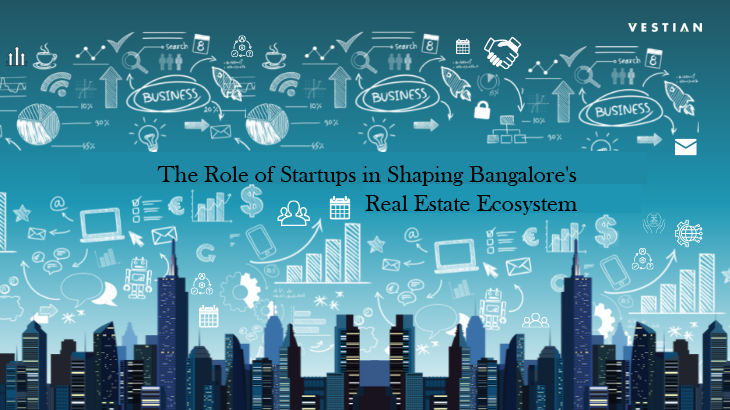The Role of Startups in Shaping Bangalore's Real Estate Ecosystem
Read latest blogs and articles from Housystan

The Information mentioned here was last updated on:
29/1/2026The Role of Startups in Shaping Bangalore's Real Estate Ecosystem
Bangalore, often dubbed the "Silicon Valley of India," has grown exponentially as a hub for technology and innovation. Alongside the tech boom, the city's real estate ecosystem has evolved dramatically, influenced significantly by the thriving startup culture. This transformation isn't limited to physical growth but encompasses a broader impact on society, economy, and the living dynamics of the city. Let's explore how startups are reshaping Bangalore's real estate landscape.
Bangalore's Boom: A Startup Haven
- Verified Tenants/Buyers
- Unlimited Property Listing
- Zero subscription/charges fee
Why Bangalore?
- Tech Hub: Bangalore hosts numerous IT giants and a tech-savvy crowd, providing fertile ground for innovative startups.
- Skilled Workforce: With prestigious institutions like the Indian Institute of Science and IIM Bangalore, the city draws in a talented pool of professionals.
- Investor Magnet: The region attracts significant investments, with venture capital flowing in to back novel ideas.
Impact on Real Estate Demand
Startups drive a consistent demand for commercial spaces, transforming the real estate landscape in the following ways:
- Office Spaces: As startups grow, there's a rising need for flexible office spaces and co-working environments that offer scalability.
- Incubators and Accelerators: These entities provide office spaces to startups, often backed by real estate companies offering competitive rates to attract entrepreneurs.
- Residential Demand: With a steady influx of young professionals, there's a growing need for modern housing solutions, propelling residential real estate.
Innovations in Real Estate Driven by Startups
Property Technology (PropTech) Revolution
Startups in Bangalore are pioneering PropTech, merging technology with real estate to streamline processes:
- Digital Platforms: Seamless platforms for property listing that enhance transparency and ease of transactions.
- Virtual Reality (VR): Startups employ VR for virtual tours, saving time for buyers and realtors alike.
- Data Analytics: Enhanced decision-making through data-driven insights on market trends and property evaluations.
Co-Living and Co-Working Trends
- Co-Living Spaces: Startups like CoHo and NestAway offer flexible, community-driven living spaces catered to the younger workforce.
- Co-Working Spaces: WeWork and other local startups offer dynamic environments, allowing flexibility and collaboration, key for startups trying to minimize fixed costs.
How Startups Influence Real Estate Values
Economic Growth and Infrastructure Boost
- Job Creation: Startups generate employment, enhancing the local economy and driving real estate prices up due to increased purchasing power.
- Urban Infrastructure: To support the startup surge, infrastructure developments such as better public transport and utility setups increase real estate desirability.
Neighborhood Transformations
- Emerging Localities: Areas like Whitefield and Koramangala have transformed into buzzing hotspots due to startup-driven growth.
- Increased Land Values: As demand escalates, land values in strategic locations rise, attracting further investments.
Challenges and Opportunities Presented by Startups
Challenges in Real Estate
- Space Crunch: With soaring demand, there's a premium on available space, leading to higher real estate costs.
- Zoning Regulations: The fast-paced growth often collides with outdated zoning laws, creating hurdles for development.
Opportunities for Growth
- Sustainable Development: Startups can pioneer sustainable building solutions, integrating green technologies to drive eco-friendly growth.
- Government Initiatives: Policies like 'Startup India’ and real estate reforms encourage symbiotic growth between startups and real estate.
The Future Outlook
Sustainable Urbanization
As startups continue to influence Bangalore's real estate, there is a move towards creating holistic urban environments:
- Integrated Townships: Envisage self-sustaining communities where work, leisure, and living spaces coexist.
- Smart Cities: With IoT and AI becoming mainstream, future developments may include high-tech cities with efficient resource utilization.
Investment Trends
- Venture Capital: Increased venture capital interest in real estate tech startups will likely spur further innovations.
- Global Attention: Bangalore's real estate will continue drawing global attention, positioning it on the international map as a prime investment destination.
Collaborative Ecosystems
The future points towards more collaborations between startups and traditional real estate players, driving projects that are innovative, cost-effective, and aligned with modern demands.
Conclusion: The Continuous Evolution
Bangalore's real estate ecosystem is in a constant state of evolution, propelled by the vigorous energy and influence of startups. This dynamic interplay not only shapes the city's skyline but also molds the socio-economic fabric of its community. By fostering a culture of innovation, startups hold the key to unlocking vast potential in real estate solutions that meet the needs of a rapidly growing urban population. As this ecosystem continues to mature, stakeholders within the real estate domain must adapt to these changes, ensuring sustainable growth and prosperity for the city.